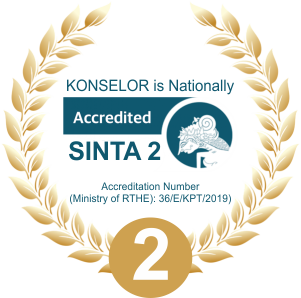Komunikasi Interpersonal Anak dan Orangtua ditinjau dari Jenis Kelamin, Tingkat Pendidikan Orangtua, dan Daerah Tempat Tinggal serta Implikasinya pada Bimbingan dan Konseling
 ), Herman Nirwana(2), Alwen Bentri(3),
), Herman Nirwana(2), Alwen Bentri(3), (1) Universitas Negeri Padang
(2) Universitas Negeri Padang
(3) Universitas Negeri Padang
 Corresponding Author
Corresponding Author
Copyright (c) 2017 Konselor
DOI : https://doi.org/10.24036/02016536500-0-00
Full Text:
 Language : en
Language : en
Abstract
Communication within the family is one of the means of parents instill the values to their children. This research background is the low skilled interpersonal communication of children and their parents. This study aimed to describe and examined: (1) interpersonal communication of children and parents in terms of sex, the last education of parent, and area of residence, (2) differences in interpersonal communication of children and parents in terms of sex, the last education of parent, and area of residence. The research methods applied in this research was ex post facto with factorial design 2 x 3 x 2. The population was students in SMAN 1 Maninjau and SMAN 1 Bukittinggi. The number of samples as much as 263 people were selected by cluster random sampling and combined with the technique propotional random sampling technique. The instruments used a Likert scale. Data were analyzed with descriptive statistics and using analysis of variance. Data analysis results showed that: (1) the general, interpersonal communication of children and parents in terms of sex, the last education of parents, and area of residence were in good category, (2) there are significant differences the variables sex, in the mean scores of female is higher than male students' the, the last education of parent and area of residence there are no differences significant. The implications of the results of this research can be used as input to create a program of guidance and counseling services, especially in the development of family.
Keywords
References
Berliana, S. A. (2012). “Hubungan antara Komunikasi Interpersonal dalam Keluarga dengan Pamahaman Moral pada Remaja”. Jurnal, 2 (3): 12.
Das, I. (2010). “Harapan Siswa terhadap Peranan Orangtua untuk Mengentaskan Masalah Mereka dalam Pelayanan Konseling (Studi pada SMA Negeri di Kota Padang)”. Tesis tidak diterbitkan. Padang: Program Pascasarjana UNP.
DeVito, J. A. (2006). Human Communication (The basic course). Boston: Perason Education, Inc.
Hargie, O., dan Dickson, D. (2004). Skilled Interpersonal Communication (Fourth edition). New York: Routledge.
Hastuti, S. Dan Sudarwati, L. (2007). “Gaya Hidup Remaja Pedesaan (Studi di desa Sukaraya, kecamatan Pancur Batu, kabupaten Deli Serdang, Sumatera Utara)”. Jurnal Harmoni Sosial, 1(2):07.
Kartono, K. (1992). Peran Keluarga Memandu Anak. Jakarta: Rajawali Press.
Kuntaraf, K. L., dan Kuntaraf, J. (1999). Komunikasi Keluarga. Bandung: Indonesia Publishing House.
Lestari, S. (2012). Psikologi Keluarga. Jakarta: Kencana Prenadamedia Group.
Santrock. (2007). Remaja. Terjemahan oleh Benedictine Widyasinta. Jakarta: Erlangga.
Shochip, M. (1998). Pola Asuh Orang Tua dalam Membentuk dan Mengembangkan Disiplin Diri. Jakarta: Rineka Cipta.
Suhendi, H., dan Wahyu, R. (2001). Pengantar Studi Sosiologi Keluarga. Bandung: Pustaka Setia.
Wisnuwardhani, D., dan Mashoedi, S. F. (2012). Hubungan Interpersonal. Jakarta: Salemba Humanika.
Mulyana, D. (2008). Komunikasi Efektif. Bandung: Remaja Rosdakarya.
 Article Metrics
Article Metrics
 Abstract Views : 1349 times
Abstract Views : 1349 times
 PDF Downloaded : 611 times
PDF Downloaded : 611 times
Refbacks
- There are currently no refbacks.
Copyright (c) 2017 Konselor







